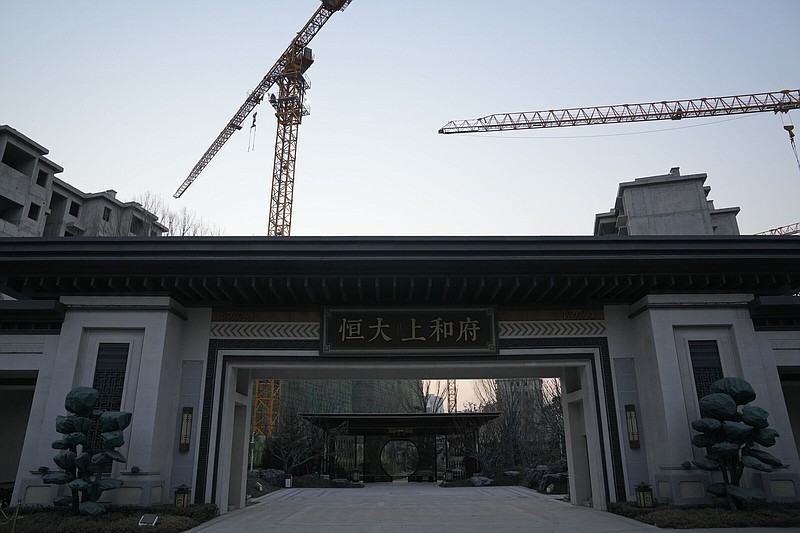HONG KONG -- Trading in shares of heavily indebted Chinese property developer China Evergrande Group was suspended in Hong Kong on Thursday, according to a notice on the Hong Kong stock exchange.
China Evergrande said in a notice on Thursday night that authorities had informed the firm that its chairman, Hui Ka Yan, had been subjected to "mandatory measures in accordance with the law due to suspicion of illegal crimes" and said that trading in the firm's shares was suspended until further notice.
The company didn't elaborate on the crimes of which Hui is suspected.
The announcement come after a Bloomberg News report, citing people familiar with the matter, that Hui was taken away by Chinese police earlier this month and put under so-called residential surveillance, a type of police action that falls short of formal detention or arrest and doesn't mean Hui will be charged with a crime. That measure means he is unable to leave the location, meet or communicate with others without approval, based on China's Criminal Procedure Law. Passports and identification cards must be handed to police but the process shouldn't exceed six months, according to the law.
Evergrande is the world's most heavily indebted real estate developer and is at the center of a property market crisis that is dragging on China's economic growth.
The group is undergoing a restructuring plan, including offloading assets, to avoid defaulting on $340 billion in debt.
Shares of Evergrande closed at 32 Hong Kong cents (about $0.04) on Wednesday. The company had resumed trading on Aug. 28 after a 17-month hiatus. Trading in two other units, China Evergrande New Energy Vehicle Group and Evergrande Property Services Group, was also halted Thursday.
Last week, Evergrande said in a filing that it had to delay a proposed debt restructuring meeting with creditors as "sales of the group have not been as expected by the company."
Last Friday, China's national financial regulator announced it had approved the takeover of the group's life insurance arm by a new state-owned entity.
Earlier in September, police in Shenzhen, a southern Chinese city, said they had detained some staff at China Evergrande Group's wealth management unit.
Evergrande ran short of cash after Beijing tightened controls in 2020 on corporate debt that the ruling Communist Party worries is dangerously high. Evergrande said it had more assets than debt but had trouble turning slow-selling real estate into cash to repay creditors.
A series of debt defaults in China's sprawling property sector since 2021 has left behind half-finished apartment buildings and disgruntled homebuyers. Observers fear the real estate crisis may further slow the world's second-largest economy and spill over globally.
In August, Evergrande applied for Chapter 15 bankruptcy protection filing in New York, which allows a U.S. court to halt litigation and other collection efforts in the U.S. in cross-border insolvency cases.
Evergrande sits at the center of a yearslong property crisis that has hurt the Chinese economy and hammered confidence in the housing market.
"There is almost zero possibility that the finances of Evergrande will stabilize let alone improve," said Willy Lam, an adjunct professor at the Chinese University of Hong Kong who has authored several books about Chinese politics.
A Bloomberg Intelligence gauge of Chinese developer stocks dropped 0.6% on Thursday to lowest level since 2011. Homebuyer sentiment remains fragile ahead of a key holiday sales period that will test the effectiveness of stimulus measures rolled out in recent weeks.
The son of a wood cutter who grew up in poverty, Hui built Evergrande into China's largest developer by using leverage to buy huge tracts of land and scoop up rivals, before branching out into industries ranging from bottled water to professional soccer and electric vehicles.
He was once Asia's second-richest person, only to see his net worth slump as his property empire crumbled. Hui is now worth about $1.7 billion, down from $42 billion in 2017, according to the Bloomberg Billionaires Index. Evergrande has $327 billion in liabilities.
The 64-year-old has been a Communist Party member for more than three decades. In 2008, he was elected to join the Chinese People's Political Consultative Conference, an elite group comprising government officials and the biggest names in business. He later secured two other five-year terms.
Information for this article was contributed by Zen Soo of The Associated Press and by Bloomberg News (WPNS).
